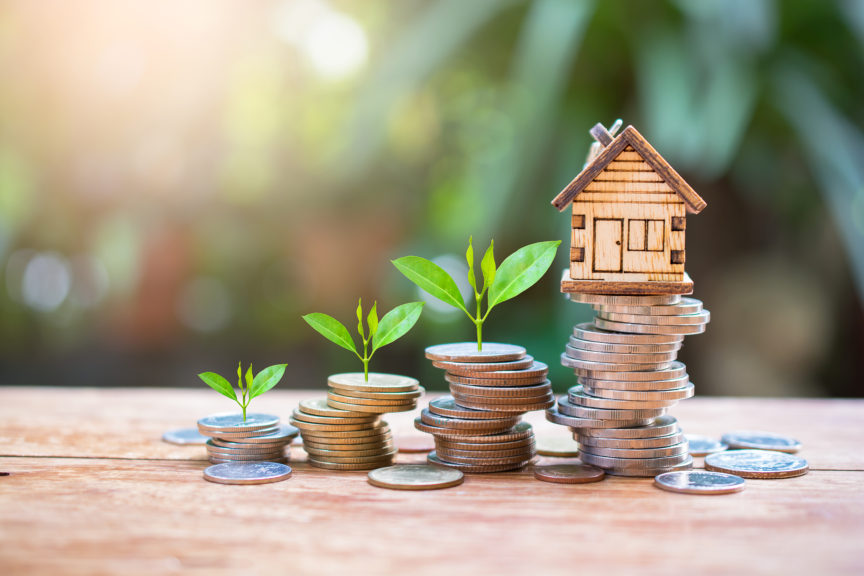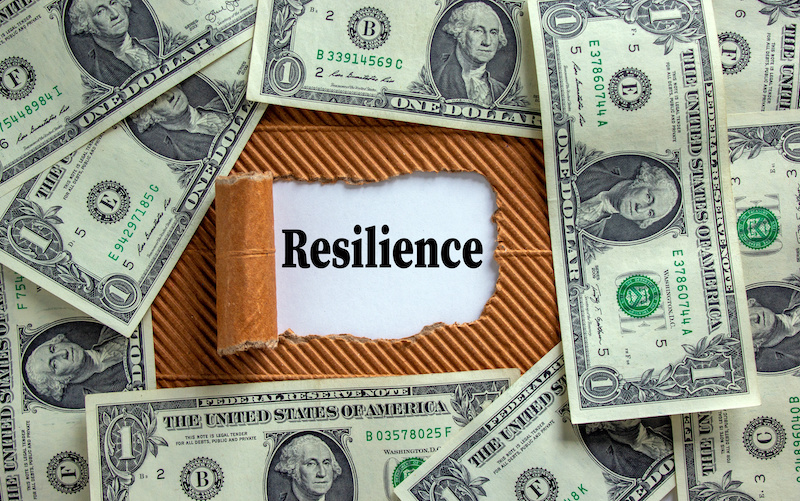As Council Joins the Fight, Local Nonprofit Wants Your Help to Stop Plastic Pollution
Briana GibbsNovember 21, 2019
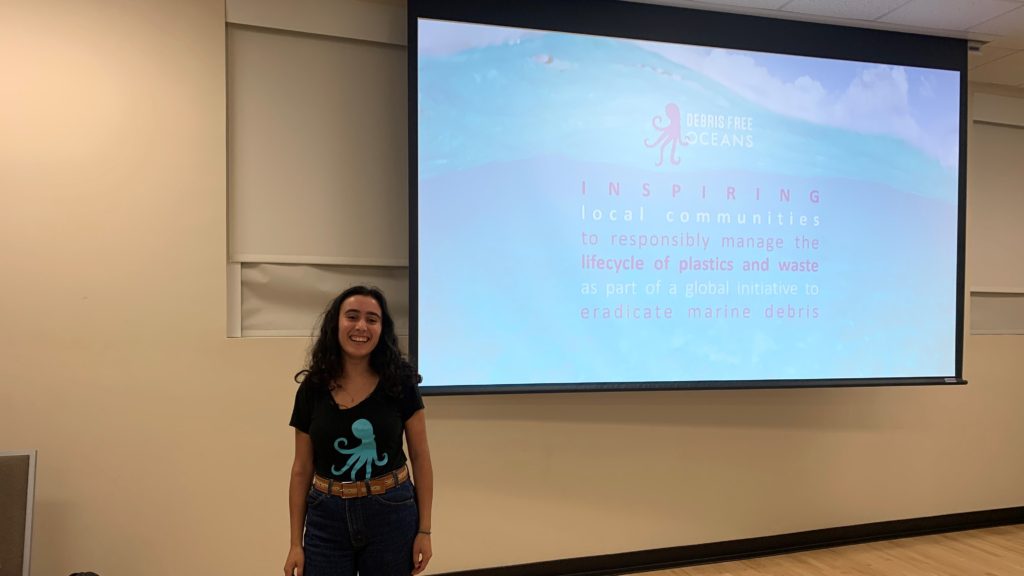
Sofia Mesa of Debris Free Ocean at the Citizen Scientist Project event November 14 (Key News/Briana Gibbs)
As the Key Biscayne Village Council took action Tuesday in the fight against plastic pollution, residents heard from environmental experts on exactly how to help.
A crowd of over 70 people – many of whom were young students from Key Biscayne – turned out Nov. 14 to hear from Sofia Mesa, the Chef Andrew Scholarship program director at local nonprofit Debris Free Oceans.
Meanwhile, the Village Council voted unanimously Tuesday to support a Florida Senate bill that seeks to repeal a statute preempting local governments from controlling plastics in their municipalities.
Mesa’s talk was part of the Citizen Scientist lecture series at the Key Biscayne Community Center. Her organization is a local nonprofit dedicated to inspiring communities to responsibly manage the life cycle of plastics and waste as part of a global initiative to eradicate marine debris. She gave the audience some general background before diving into specific strategies.
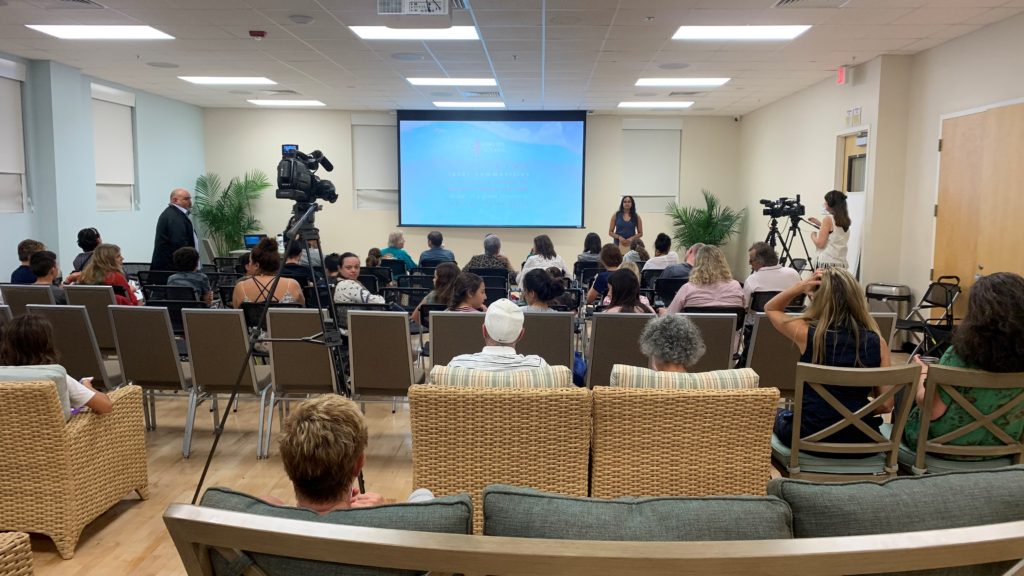
The audience crowded into the community center for the Debris Free Oceans presentation (Key News/Briana Gibbs)
Marine pollution can be a tough topic to talk about. It spans areas as wide as the Atlantic and Pacific Ocean and is a persistent problem. Recently, it has been estimated that the number of plastic particles in the ocean is 500 times the number of stars in the Milky Way Galaxy. Another sobering statistic is that 80% of marine debris comes from land-based sources.
So what exactly is wrong with plastic?
Plastic is a petroleum product that does not decompose. Rather than biodegrading like natural items that will rot in the sun, plastic photodegrades. Photodegradation causes large pieces of plastic to break down into ever smaller pieces until what remains are ‘microplastics.’ In addition to maintaining their plastic properties, microplastics absorb persistent organic pollutants including DDT and polychlorinated biphenyls.
Plastic in the marine environment has many impacts. Marine debris has been documented to be affecting 800 aquatic species in two main ways – by entangling organisms and by ingestion.
But marine organisms aren’t the only ones ingesting plastic. Microplastics have been documented in human food items including drinking water and seafood. The human impacts multiply when plastic-polluted water has the potential to start encroaching on tourism dollars in a beach-lined destination such as Miami.
In the face of this bad news, Mesa told Key Biscayners not to be discouraged, because there are many steps locals can take to make a difference in the plastic pollution problem. Mesa challenged her audience to change the status quo of producing plastic, consuming plastic and discarding plastic.
One method she offered was the ‘5 Rs’ for reducing plastic pollution to net-zero waste:
- Reduce single use plastics. From plastic straws to plastic bags from the grocery store (or takeout food) to utensils, cups and bottles – the list to tackle is long. But event attendees got a head start with a set of bamboo utensils and a reusable steel tumbler. Other alternatives are to use reusable shopping bags, reusable water bottles and reusable straws.
- Reuse plastics you are forced to buy.
- Recycle as a last resort. Mesa reminded Key Biscayne citizens localities have their own rules about recycling. Here on the Key, it is not possible to recycle Styrofoam (such as takeout containers), plastic cups or batteries.
- Recapture plastic material from places like landfills or coastal cleanups. Mesa said this is a step that can be left to the professionals, but it helps lead into the fifth R.
- Redesign to create items we need from plastic that is recaptured. There are a few local groups working to create beautiful products from recaptured plastic including Free Plastic and Waterlust.
After the presentation the room was buzzing with energy. Mesa reminded residents that “your livelihoods depend on our relationship with the ocean,” and asked consumers to “take that into consideration throughout your day.”
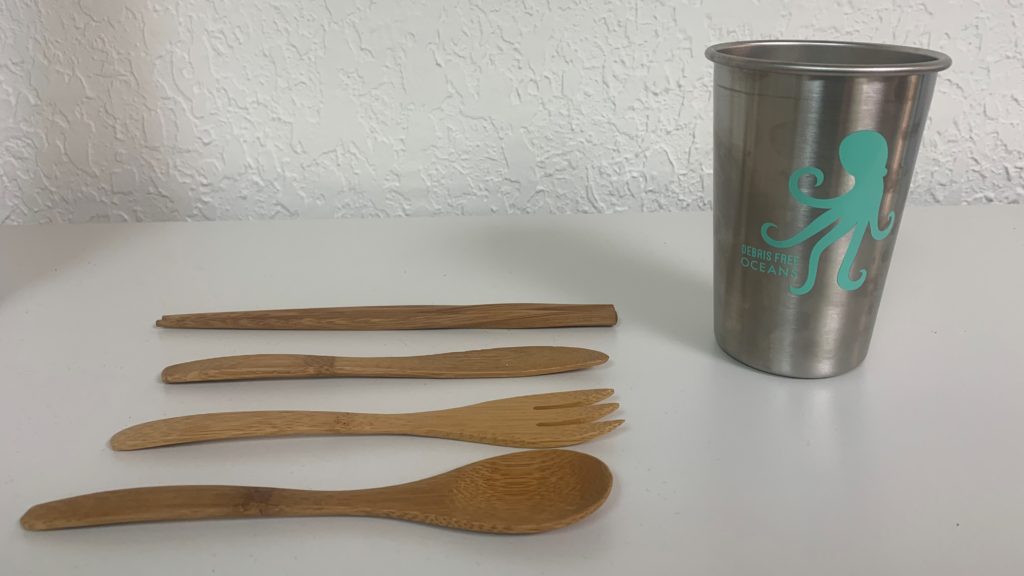
Debris Free Oceans provided attendees with reusable steel tumblers and bamboo utensils to help start the process of reducing plastic consumption (Key News/Briana Gibbs)
Attendee Camilo Sanchez said of the event, “I think it’s important for the kids to see what’s actually happening.”
His daughter Daniela Sanchez Zaccaria said she’s seen “water bottles and bags” on the beaches.
In the Council chambers, Council Member Ignacio Segurola’s resolution passed with little need for discussion.
“This is a fight we should be weighing in on,” said Mayor Mike Davey.
See Key Science for more information and future events.
